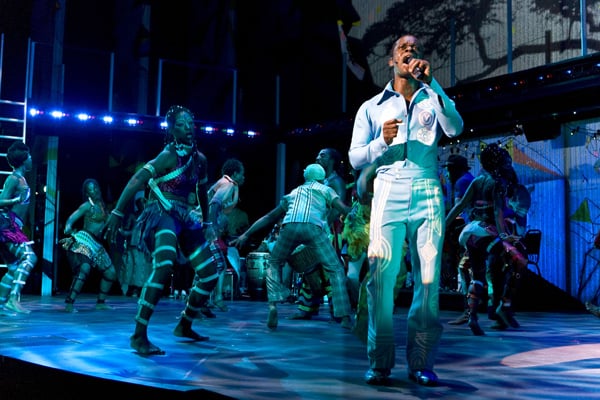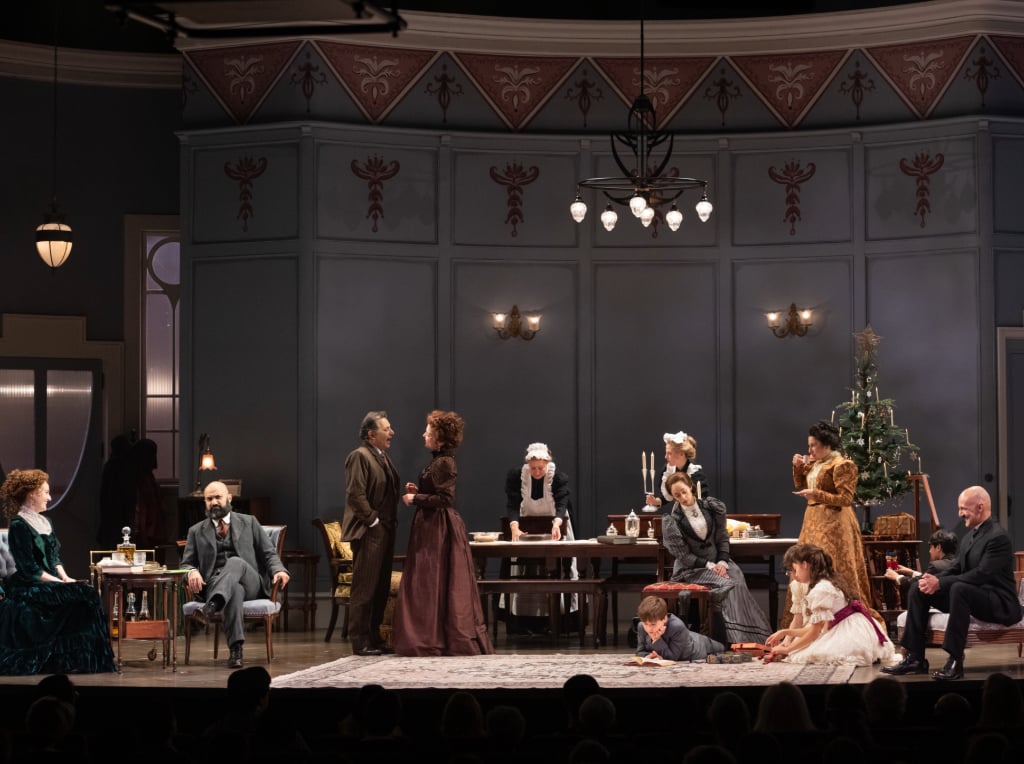Sahr Ngaujah as Fela Kuti and the cast of FELA! Photograph by Monique Carboni
☆☆☆ stars out of four
Injecting politics into musicals can be a mixed bag (consider the confusing presence of Che Guevara as a narrator in Evita, or the effective subtext about immoral leadership and shameless populism in Wicked). Lucky then that Fela!, currently playing at Shakespeare Theatre Company’s Sidney Harman Hall, has such gorgeous music to work with from the oeuvre of Fela Kuti, Nigerian musician, creator of Afrobeat, and political activist. Kuti’s engaging, joyful compositions are so foot-tappingly contagious that we’re not prompted to dig too deeply into the arguably questionable morality of their creator.
Fela!, which is kicking off its national tour at the Harman Center this month following a Tony-winning Broadway run, is undeniably an extraordinary spectacle, and one that envelops and charms the audience—in large part thanks to the charismatic Sahr Ngaujah, who plays Kuti. Not so much breaking the fourth wall as grinding it into submission, Ngaujah welcomes the audience into Kuti’s club, appropriately titled The Shrine, where the scene is set in 1978 in Nigeria. Kuti, already globally recognized for his music, is mostly holed up here, provoking the ire of Nigerian rulers with his politically conscious lyrics. The stage is a visual masterpiece of sensory effects, with lyrics and news clippings projected onto the background, video screens revealing moments from history, and a vaguely deific portrait of Kuti’s mother, Funmilayo (Melanie Marshall) resting above the stage.
Kuti’s music not withstanding, Fela‘s success is in large part due to Bill T. Jones, who directed and choreographed the show, winning a Tony in 2010 for his aggressively physical, impossibly exuberant routines. Kuti’s Shrine plays host to a team of ensemble dancers, helping reinforce the visual dynamism of Fela!, as well as its (possibly unintentional) projection of Kuti as a sort of extravagantly virile cult leader. Kuti’s character compels the audience to stand and gives them an impromptu dance lesson; he also smokes enormous spliffs onstage, announces his intention to marry all 12 of his female dancers (in reality, this is small potatoes for Kuti, who actually married 27 women in 1978 alone), and asks the audience how many of them have ever been incarcerated (this being Washington, people seemed vaguely unwilling to fess up).
Does any of this matter? Not really, since the spotty narrative skates over Kuti’s biography and chooses instead to focus on his musical genius, his repression at the hands of the Nigerian government, and, most of all, his irrepressible, flamboyant joie de vivre. Who, after all, doesn’t love a charming, self-professed bad boy who just wants to have a good time? (There’s a reason Charlie Sheen is a folk hero.) That said, one of the show’s strongest moments is when it briefly abandons the do-or-die cheerfulness to focus instead on what happened to Kuti’s wives when his compound was raided—the mostly silent, projected tales of horrifying brutality remind us why Kuti was such a significant figure at the time.
Does he deserve a musical tribute? Yes. Does he deserve a selectively one-sided canonization? No. This is a mostly glorious and affecting show to watch, but its selective approach to Kuti’s biography is frustrating: There’s no mention of his death from AIDS-related diseases, and the haphazard narrative doesn’t always help us understand what he was fighting for. But moments of political awareness, culminating in a effective final scene where small coffins (adorned with obscure names of tragic victims, from British teenager Stephen Lawrence to Nigerian activist Ken Saro-Wiwa) are piled into a sort of physical shrine, add redemption, and Ngaujah’s performance as Kuti is outstanding. He might be a flawed hero, but Kuti’s music, rightfully, speaks for itself.
Fela! is at Shakespeare Theatre Company through October 9; tickets ($25 to $115) available at Shakespeare Theatre’s Web site.
Subscribe to Washingtonian
Follow Washingtonian on Twitter
Follow the After Hours Blog on Twitter
More>> After Hours Blog | Arts & Events | Happy Hour Finder | Calendar of Events

















